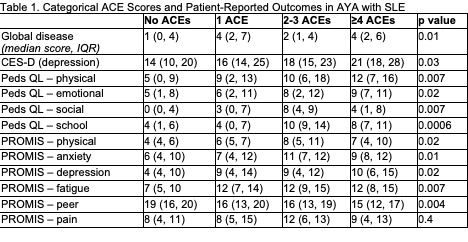Session Information
Session Type: Poster Session B
Session Time: 10:30AM-12:30PM
Background/Purpose: Adverse childhood experiences (ACEs), are major life stressors that occur before the age of 18 and include experiences of household dysfunction. Recently, prior trauma, including childhood trauma, was found to be associated with incident systemic lupus erythematosus (SLE). Our previous work showed that people with SLE in the Bronx were more likely to be affected by ACEs than people without SLE. To gain a better understanding of the relationship between ACEs and disease outcomes in youth with SLE, we investigated the relationship between ACE exposure and patient-reported outcomes in adolescents and young adults with SLE.
Methods: We performed a secondary data analysis of the baseline data from a longitudinal observational study of adolescents and young adults (AYA) with SLE. People with SLE, ages 12-21 were recruited from outpatient clinics at the Children’s Hospital at Montefiore and Northwell Health. Participants were emailed links to a REDCap survey to complete questionnaires remotely on patient-reported outcomes including, PEDS-QL quality of life measure, PROMIS-25 pediatric global health index, depression symptoms questionnaire (CES-D) and an ACE questionnaire. ACE scores were then calculated as a total count from 0-9 and then categorized as 0, 1, 2-3, and ≥4 ACEs to reflect prior literature that shows a threshold effect at 4 ACEs for many health-related outcomes. Data was originally collected between 9/2019-3/2023.
Results: Among 94 AYA with SLE included in the original study, 91 (97%) completed ACE questionnaires at baseline visits and were included in the analysis. Among those included, 58 (64%) reported any ACE exposure, 17 (19%) reported 1 ACE, 17 (19%) reported 2-3 ACEs, and 24 (26%) reported ≥4 ACEs. Patient global disease scores, CES-D scores, all Peds-QL (physical, emotional, social, school), and PROMIS subscales for physical function, anxiety, depression, fatigue, and peer relationships were significantly associated with categorical ACE scores, with higher ACE exposure associated with worse outcomes (see Table 1). PROMIS subscales for pain were not associated with ACE scores.
Conclusion: Higher ACE exposure is associated with worse patient-reported outcomes related to global disease scores, health-related quality of life and depression symptom severity scores in AYA with SLE. In future analyses we intend to investigate whether ACE scores are associated with worse outcome progression over time and whether they are associated with physician-reported SLE disease activity and severity measures. Further work needs to be done to see whether addressing stress around ACEs in youth with SLE can improve disease outcomes.
To cite this abstract in AMA style:
Rubinstein T, Dave A, Calistro T, Rapoza K, Berkowitz S, Hui-Yuen J, Mian Z, Masi E, Kenney-Riley K. Adverse Childhood Experiences Are Associated with Patient-Reported Outcomes in Adolescents and Young Adults with Systemic Lupus [abstract]. Arthritis Rheumatol. 2024; 76 (suppl 9). https://acrabstracts.org/abstract/adverse-childhood-experiences-are-associated-with-patient-reported-outcomes-in-adolescents-and-young-adults-with-systemic-lupus/. Accessed .« Back to ACR Convergence 2024
ACR Meeting Abstracts - https://acrabstracts.org/abstract/adverse-childhood-experiences-are-associated-with-patient-reported-outcomes-in-adolescents-and-young-adults-with-systemic-lupus/

